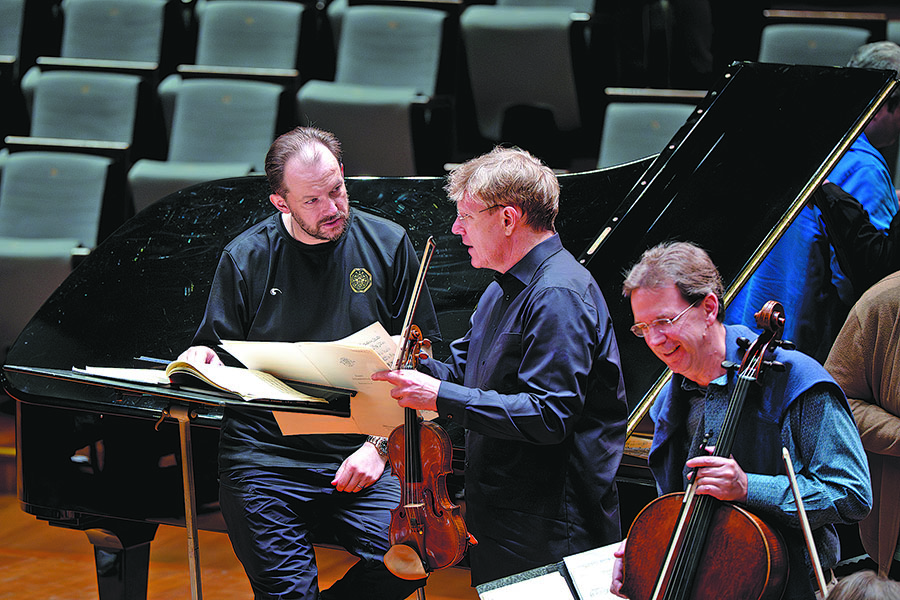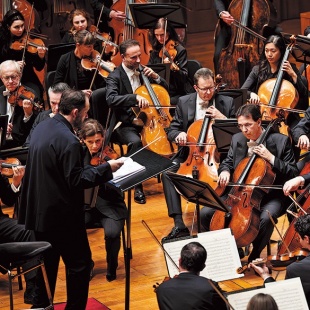Vienna's philharmonic triumph


Other highlights include Beethoven's Piano Concerto No 3 in C Minor, Op 37, which is a masterful and intense composition that marks a significant development in the piano concerto form, and Richard Strauss' Ein Heldenleben, Op 40, or A Hero's Life, which is considered one of his most ambitious and innovative compositions. This piece blends autobiographical elements with grand orchestration to depict the life, struggles, and triumphs of a hero. Pianist Yefim Bronfman performed during the concerts in Beijing.
On Monday, the enraptured audience applauded vigorously, calling for encores. The orchestra responded with two famous Viennese pieces: Josef Strauss' waltz My Life Is Love and Joy, and Johann Strauss II's lively Tritsch-Tratsch Polka. The encore allowed the Vienna Philharmonic to display its trademark style of charm and technical elegance, transporting the Beijing audience to the heart of Vienna.
"Chinese classical music enthusiasts know the Vienna Philharmonic through watching our New Year Concert, which has been broadcast in China for years. It has helped us to gain lots of fans, for which we are grateful," says Froschauer, adding that the 2025 New Year Concert will take place on Jan 1, under the baton of maestro Riccardo Muti in the Golden Hall at Vienna's Musikverein. To celebrate the 200th anniversary of Johann Strauss II, eight of his masterworks are scheduled, with less familiar pieces programmed for the second part of the concert, including the Ferdinandus Waltz, which was written by Constanze Geiger, a contemporary of Strauss, and the first composition by a woman to be performed as part of the New Year Concert.
"We are thrilled to connect with Chinese audiences and celebrate our shared love for classical music. Whenever we return to China, we see many new concert halls, and feel the growing interest in classical music, particularly among young audiences," says Froschauer.
"To keep the orchestra's tradition, the key is to take on new and young musicians," says Michael Bladerer, general manager of the philharmonic, who also plays contrabass with the orchestra. "For this tour, we have some new members with us, who stood out from our Vienna Philharmonic Orchestra Academy. We know that there are many talented musicians from China, and we want to have them in our academy, and even become members."
The Vienna Philharmonic Orchestra Academy was founded in the summer of 2018. Its main objective is the training of young musicians through individual private lessons, and preparing them for chamber music, auditions, and orchestral training by working with the orchestra.
"We are often asked about the unique sound of the orchestra and the reasons behind its longevity. I would say that there is perhaps no other musical ensemble more consistently and closely associated with the history and tradition of European classical music than the Vienna Philharmonic," Bladerer says.
He adds that besides this history, the other notable aspect is the relationship between the Vienna State Opera orchestra and the Vienna Philharmonic. Only a member of the Vienna State Opera orchestra can become a member of the philharmonic. Musicians must prove their ability at the state opera over a period of three years before becoming eligible to submit an application for membership in the association of the philharmonic.
"Both Froschauer and I started by performing in the Vienna State Opera orchestra. Opera productions are full of drama, love and skill, which means the playing must be dramatic and passionate. We kept that passion when we joined the philharmonic," Bladerer says.





































